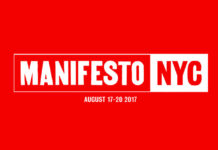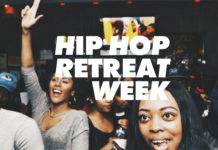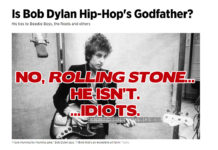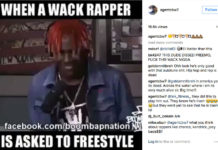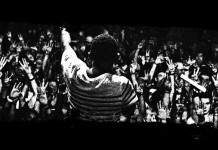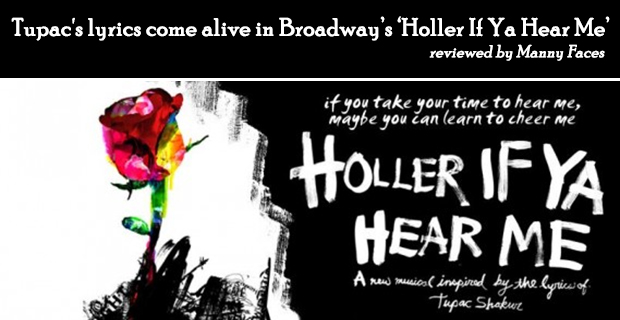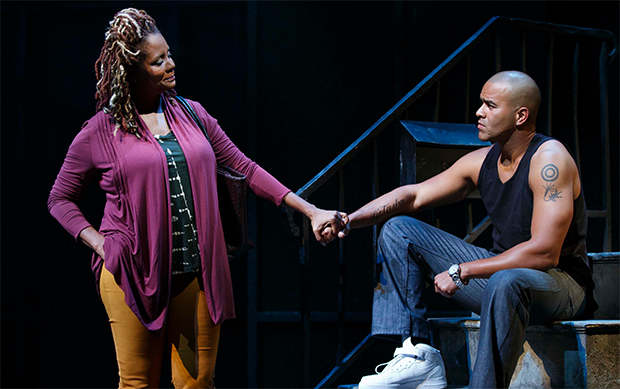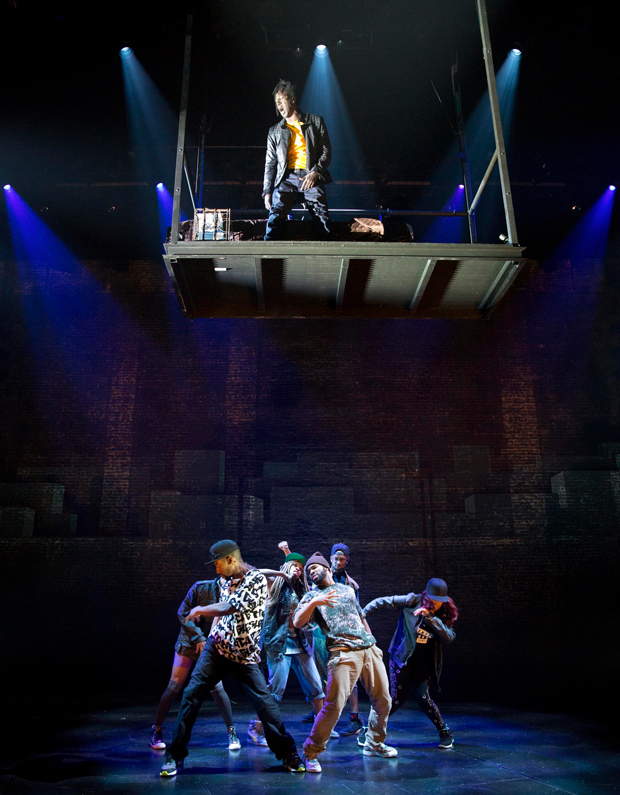The lyrics and emotional range of late rap titan Tupac Shakur come alive on Broadway in Holler If Ya Hear Me, now playing at the Palace Theatre.
Few figures in popular culture were as polarizing or managed to invoke as many mixed feelings as the late musician, Tupac Shakur.
From the first time he entered popular culture’s consciousness as a wide-eyed, bootie-chasing jokester in the video for his 1993 breakout song “I Get Around,” to the tear-inducing, personal dedication, “Dear Mama,” to his near-militant public persona in the wake of his shooting of two off-duty police officers, Tupac Shakur was, if nothing else, a man full of emotions and contradictions that spanned much of the spectrum of the human condition.
These characteristics remained evident throughout a career that spanned music and movies, left behind in an expansive body of work, content that has been revered by fans, respected even by some detractors and lives among humankind’s highest regarded literature as part of university-level curriculum.
Now, the lyrics of Tupac Shakur have become further immortalized, coming to life on the Great White Way, in the form of Holler If Ya Hear Me, the new Broadway musical playing at the Palace Theatre.
The production, directed by recent Tony Award winning Kenny Leon (A Raisin in the Sun), is not biographical. Holler If Ya Hear Me is a story, set in an unnamed-but-familiar-enough-feeling Midwest city, following the lives of a few interconnected residents as they navigate a tough, gritty city life, grasping for positive relationships despite hardship, watching hope get offset by violence.
The cast, a generally energetic, talented and enthusiastic young ensemble, portrays a variety of characters, likable and villainous, transformative and stubbornly one-dimensional. Led by slam poet Saul Williams, they play out a storyline that pit-stops along the way with songs from Shakur’s catalog, adeptly interpreted by live musical backing. The songs and music often remains true to the original version, with occasional rearrangements, most with spirited choreography and vocalized zest from the cast members.
While the cast does well enough with the delivery of the script and story — all are quite capable at delivering the dialog, spoken, sung or rapped — the degree to which one will truly appreciate these efforts may depend hugely upon who you are and what you are expecting from the show.
For hip hop fans, particularly fans of Tupac, one might marvel at the clever way the Todd Kreidler-penned tale was constructed to weave in the songs that made Tupac such a transformational rapper. The full range of his emotive writing is on display, serving both as powerful backdrops to situations in the story as well as nostalgia-triggers, pulling those who can connect to the music further into the story.
For open-minded theater-goers not familiar with Tupac’s work, but able to follow the lyrical content — even when delivered in an authentic, occasionally rapid-fire manner — an appreciation for the depth of his lyrical content and subject matter will assuredly not go unnoticed. The fact that these songs, and their wide-range of subject matter, were not created for the story – rather, the other way around – will impress those who might only have had cursory knowledge of Tupac’s work, or whose recollection of him was limited to brief, unflattering appearances on the 11 o’clock news.
It is, unfortunately, those same qualities, that might work against the show. Much of the general public, particularly those who traditionally attend Broadway productions, might fall in between those extremes, and might find themselves unable to connect to the story, unimpressed by somewhat tenuous character development and unappreciative of the musical selections, if not due to an aversion to rap music, perhaps for the delivery — entertaining for sure, but perhaps not up to standards other spectacles in the neighborhood are able to achieve.
A case in point, as two older gentlemen, sounding somewhat connoisseur-ish with an open mind to this production, were overheard lamenting the fact that Holler doesn’t have a central character to truly “connect with,” no one “tugging at your heartstrings.” They don’t seem to connect to the story, even though they want to.
Some of this could be attributed to true cultural disconnect, but performances at this level are ideally able to draw in a viewer, no matter how removed from the world the story lives in. This wasn’t entirely the case with Holler If Ya Hear Me, even for those more familiar with the landscape being represented. While several characters were likable, and several relationships were worth rooting for, the sum of the ensemble was, in many ways, greater than the individual parts.
There were flashes, however, of near brilliance, both in how the music worked itself into the tapestry of the story, as well as the individual and collective performances. Songs such as “Dear Mama,” with a particularly strong message and fueled by an emotional kick in the nostalgic ass, were an emphatic success. Other songs, like the playful, yet iconic “I Get Around,” had the reverse effect, nagging the part of my conscious that knew the story was created simply to incorporate Tupac songs. Even though that particular number was saved by a clever twist, it still felt a little too Glee-like for my taste.
These flaws are perhaps unavoidable. It is no easy task to cater a show like this to the masses, but the effort was admirable. Even if Holler If Ya Hear Me might not resonate with casual viewers or Broadway stalwarts, the exuberance and talent of the cast, the dramatic story turns, a few genuinely laugh out loud moments and the fact that hip hop music is so well represented, make this production audacious, ambitious and well worth the time.
It is also extremely important. It is imperative to preserve and protect the true legacy of rap’s often misunderstood icons, particularly those who have left this world, and it is comforting to know that Tupac’s has been so well guarded (his mother, Afeni Shakur, is a producer).
Knowing that every lyric was penned by a young, poetic, conflicted, famous, extroverted superstar who references crying as much as he referenced revolution, who laughed as much as he hollered, casts an impressively profound glow over the entire production.
With that, and an open mind, many theatergoers will indeed leave feeling like they got a chance to really hear him.
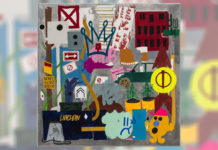
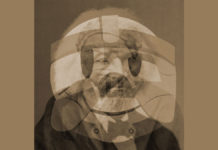
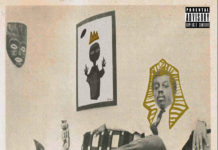
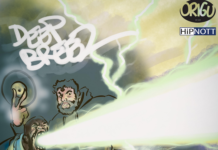

![The Underachievers – Crescendo [VIDEO]](https://www.birthplacemag.com/wp-content/uploads/2017/08/hqdefault-2-218x150.jpg)


![Fat Joe & Remy Ma ft. The-Dream – Heartbreak [VIDEO] Fat Joe Remy Ma The Dream - Heartbreak Video](https://www.birthplacemag.com/wp-content/uploads/2017/05/fat-joe-remy-ma-218x150.jpg)
![JSWISS featuring Chandanie – LML [VIDEO] JSWISS featuring Chandanie - LML [VIDEO]](https://www.birthplacemag.com/wp-content/uploads/2017/05/JSWISS-218x150.jpg)

![Akinyemi Ends Summer With “Summers” EP Release Show [9-17-17] Akinyemi 'Summers' EP release show at Brooklyn Bazaar](https://www.birthplacemag.com/wp-content/uploads/2017/09/summers-featured-218x150.jpg)
![4th Annual NYC VS EVERYBODY Yacht Party [9/16/17] #VSYacht 4th annual NYC VS Everybody Yacht Party#VSYacht](https://www.birthplacemag.com/wp-content/uploads/2017/09/vsyacht-218x150.jpg)
